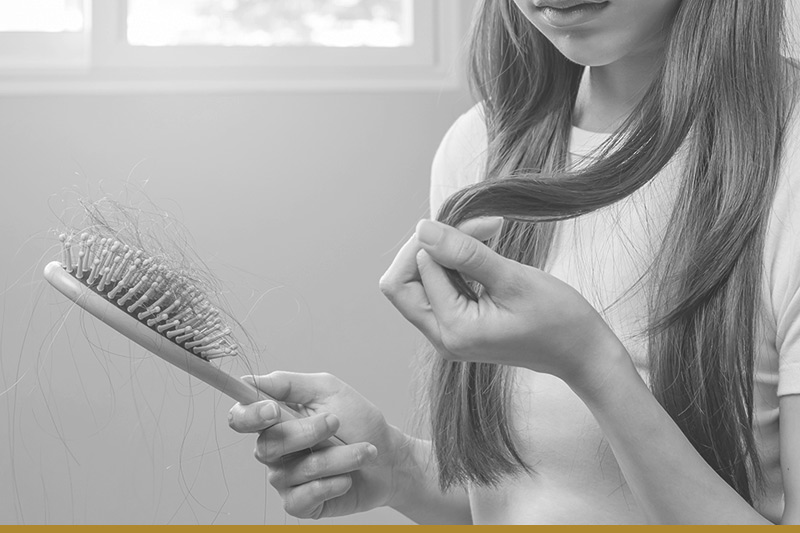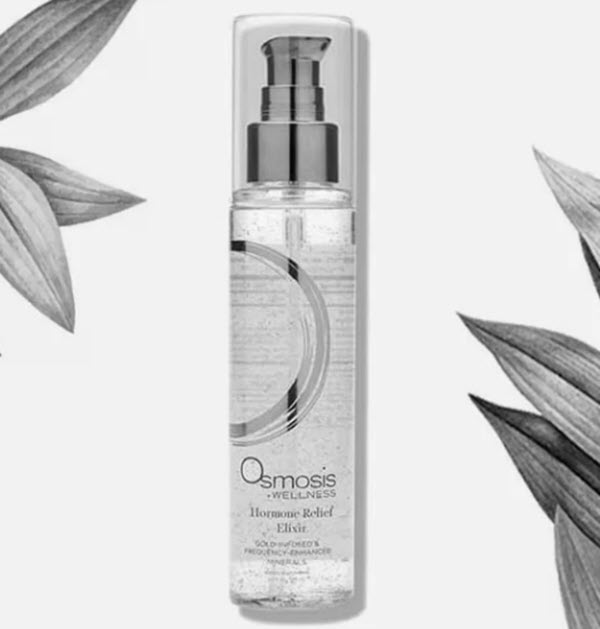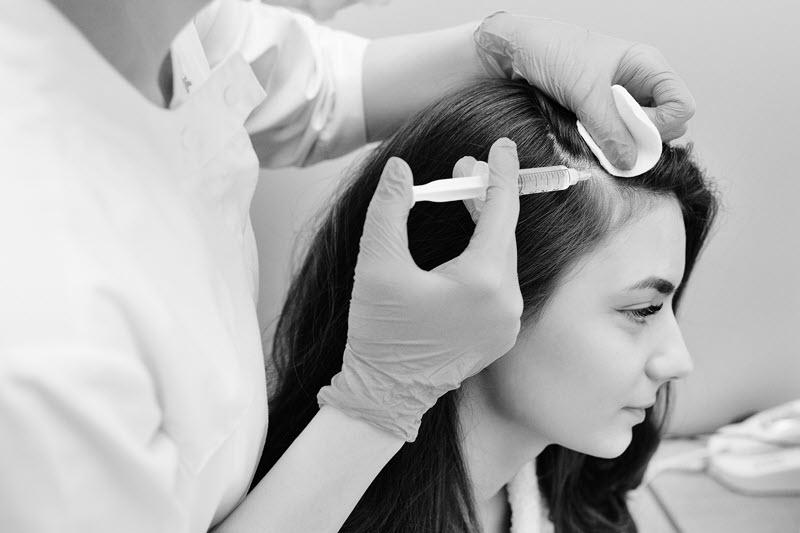Hair loss (alopecia) has multiple causes and affects both men and women. It is temporary and treatable if it is stress-related or caused by a hormonal imbalance. Non-invasive treatments paired with the proper vitamin supplementation can help reverse hair loss and prevent further hair thinning.
This article discusses the causes and symptoms of hormonal hair loss and outlines preventive measures.

Hormones play a vital role in the overall health of your hair, skin, and nails. In some cases, hormonal imbalances trigger hair thinning or significant hair loss. The following hormones affect hair quality:
Androgenetic alopecia is the most common reason for hair loss, affecting both men and women. It is triggered by an excess of androgens (male sex hormones), specifically dihydrotestosterone (DHT). This byproduct of testosterone disrupts the normal hair cycle and shrinks the hair follicles.
Because they have more androgens, men are more susceptible to androgenetic alopecia but women also experience it. In women, hair loss due to raised DHT typically occurs during menopause, when estrogen and progesterone levels decrease. PCOS or polycystic ovarian syndrome also causes hair loss due to an increase in production of androgens, including DHT.
Note: Some women going through menopause can benefit from testosterone therapy to decrease unpleasant symptoms and boost quality of life.
Fluctuating estrogen levels trigger multiple hormone-related conditions. One of them is Telogen effluvium, excessive hair shedding that happens when follicles stay locked in the resting state. High estrogen levels produce greater hair volume and thickness during pregnancy. Hair grows in excess during this prolonged active phase (anagen).
After giving birth, women experience a sudden drop in estrogen production. The hair cycle then moves to a prolonged resting phase (telogen). As a result, hair follicles become inactive. This condition is also known as postpartum hair loss. It usually lasts up to three months after childbirth.
During menopause, women experience a significant dip in progesterone levels. Progesterone inhibits the conversion of testosterone into DHT. Consequently, when levels of progesterone drop, DHT levels rise, causing damage to hair follicles.
Thyroid hormones affect the skin and hair and both an underactive (hypothyroidism) and overactive (hyperthyroidism) thyroid gland can influence hair quality and structure. If left untreated for an extended period, thyroid hormone disbalances cause hair to break, thin and even fall out. Medication for these two autoimmune conditions usually reverse this type of hair loss.
Insulin resistance is not only a precursor of diabetes and weight gain. Uncontrolled blood sugar levels slow down hair growth as well. In some pre-diabetic patients, blood sugar levels trigger copious hair fall.
High levels of insulin can trigger male pattern baldness in some women. This condition happens due to excessive male hormone production or heightened sensitivity to normal levels of male hormones in the body.
Type-1 diabetes patients can develop alopecia areata that causes circular bald patches. The immune system attacks the healthy hair follicles, slowing the hair cycle and interrupting growth, triggering hair shedding in different body parts.
Note: Type-1 diabetes also affects weight gain. Learn more about how insulin affects weight loss and how to restore a healthy insulin function.
Chronic stress builds up cortisol, the stress hormone. Elevated cortisol levels decrease cell regeneration and impair hair quality. In some instances, this leads to hair falling out in clumps and patchy bald spots.
Increased cortisol can be an inhibiting factor in hair regrowth. Cortisol disrupts cyclic regulation and affects hair follicle stem cells. This disruption shifts the hair cycle from anagen (active phase) to telogen (resting phase), resulting in rapid hair shedding.
Moreover, people enduring constant stress can develop a hair-pulling disorder called trichotillomania. This irresistible urge to pull out hair creates a vicious cycle, producing even more stress.
Typical hair loss symptoms associated with hormonal imbalances include:
Less common symptoms accompanying these are brittle hair, itchy scalp, burning and skin tenderness.
Early signs of hormonal hair loss vary from person to person. Additional symptoms may indicate that hair loss is due to a hormonal imbalance:
The good news is you can slow down and even reverse hormonal hair loss. There are safe ways to regrow your hair and make it thicker and healthier.
Menopause causes hot flashes, mood swings and even significant hair loss. Female hormone replacement is a therapy that reduces these annoying side effects by replacing hormones that are at a lower level, such as estrogen and progesterone.
Female bioidentical HRT is an FDA-approved therapy that alleviates the unpleasant symptoms of menopause and can help with hormonal hair loss. It involves the use of special formulations of estrogen and progesterone derived from plants. Because they are chemically identical to the hormones in our bodies, they have a high safety profile.
Note: Follow the link to learn more about bioidentical hormone replacement therapy and whether it suits your needs.
In addition to these treatments, medical experts prescribe supplements to nourish and energize hair. Supplements boost hair growth by stimulating dormant hair follicles.
Nutrafol is a clinically tested, medical-grade supplement dermatologists recommend for naturally restoring hair growth. Another popular hormone balancing supplement is Osmosis MD Hormone Relief Elixir.

These vitamins are essential components in maintaining hair and skin health:
Note: Learn what are the vitamin C IV therapy benefits and can vitamin C help you lose weight.
Adopt a healthier lifestyle to maintain hair health. Eat dark, leafy greens packed with nutrients and essential vitamins. Drink plenty of water to keep yourself hydrated. Lack of water makes hair and nails brittle.
Add a regular fitness regime that fits your busy schedule. Exercise lowers your blood sugar levels up to 24 hours, makes your body more sensitive to insulin and reduces the risk of developing diabetes, which can cause sudden hair loss.
Platelet-rich plasma (PRP) treatment is a hair loss treatment that stimulates hair regrowth and improves thickness and volume after several sessions. The medical provider injects platelet rich plasma taken from the patient’s blood sample into the targeted area of the scalp. This process effectively regenerates hair follicles.
Dermatologists recommend this treatment in early stages of hair loss, no longer than five years after the first symptoms.

If you’re interested in hair restoration with PRP, Vibrant Skin Bar can restore your healthy locks.
If persistent hair thinning worries you, get your hormone levels tested to establish if this problem is a result of a hormonal imbalance. Schedule a consultation with a medical professional to determine whether hormone deficiencies exist.
Success rates for hormonal hair loss treatments are reassuring. The right hair growth treatments and a suitable dietary supplement produce optimal results. Additionally, a nutrient-rich diet packed with vitamins and regular exercise boosts metabolism, improves bodily functions, and naturally balances hormones.
It is essential to consult a medical expert in this field to understand the root cause of the hair loss problem. Reach out to us at Vibrant Vitality Clinic for a holistic, personalized approach to hormonal hair loss problems.




4325 E Indian School Rd, Suite 130
Phoenix, AZ 85018
United States
(480) 422-2058
info@vibrantvitalityclinic.com
Monday - Friday: 9:00 am - 6:00 pm
Saturday: 9:00 am - 3:00 pm
Sunday: Closed
